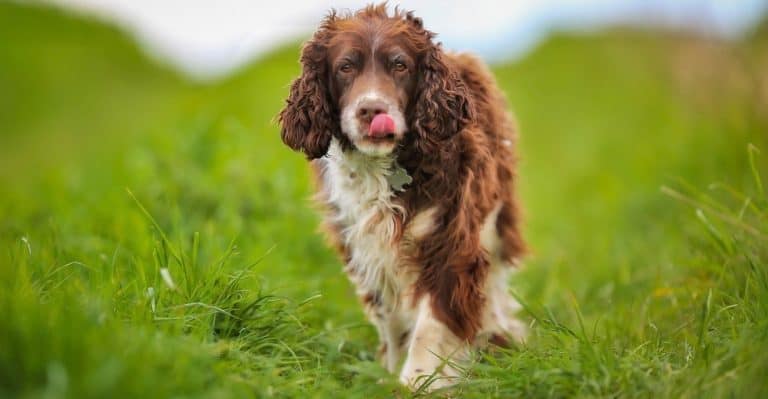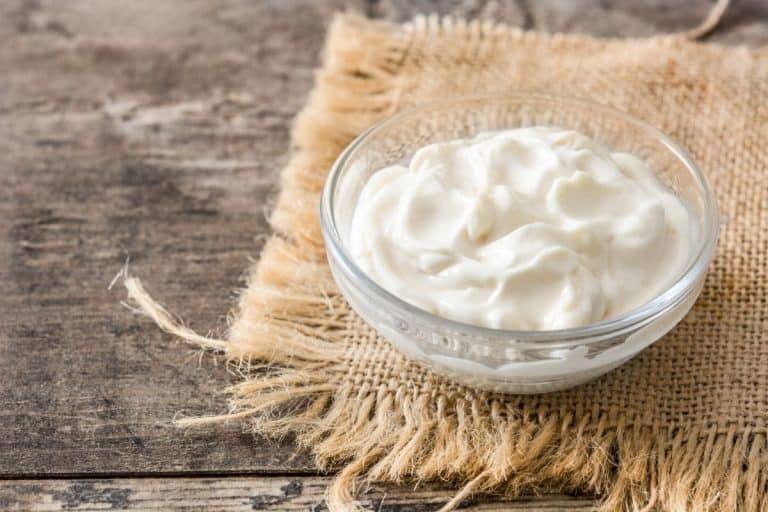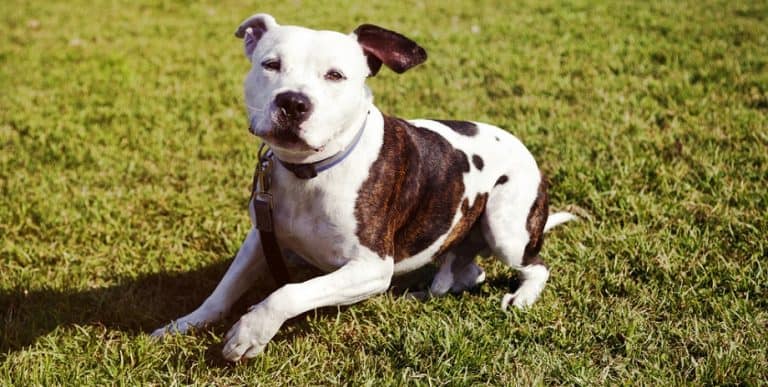Bichon Frise Weight Chart – Size & Growth Chart
If you have just adopted a Bichon Frise, you may have a lot of questions regarding their growth and size.
A Bichon Frise growth chart will give you information on what to expect as your puppy grows and how big they will get so that you can be prepared.
As an adult, a Bichon Frise weighs between 10 and 16 pounds and has a height of between 9 and 11 inches. Typically, males are bigger than females, but females grow faster than males.
As a Bichon owner, you should take good care of your puppy to ensure that they have a healthy weight throughout their growth, and they can have a long and healthy life.
Your puppy’s growth pattern and weight can tell you a lot about their health and if they have any underlying conditions.
This article will provide you with information about the Bichon Frise weight chart when they are fully grown, factors affecting their growth, genetic health issues that affect them as a breed, and many more!
When Is A Bichon Frise Fully Grown?
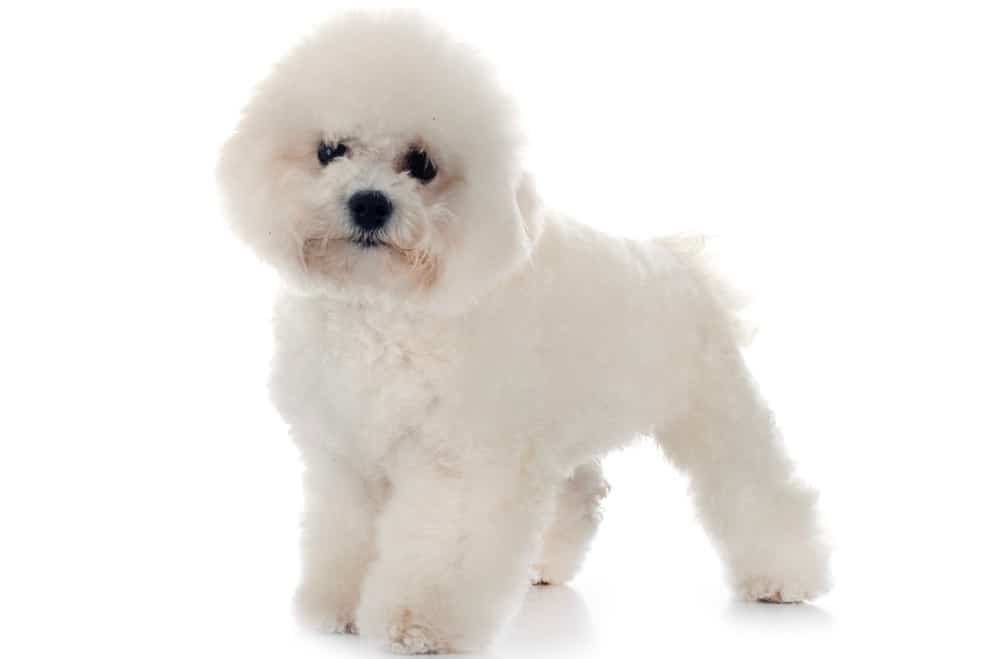
In the first eight months of their life, Bichon puppies grow very fast and will reach 95% of their adult weight at this age.
Then they will gradually be adding more fat and muscle to fit their body frame.
At the age of 10 months to one year, your puppy reaches their adult weight and stop growing. On average, Bichon females grow faster and reach their full size earlier than Bichon males.
Also, male Bichons are slightly larger than female Bichons.
They will reach their sexual maturity at around the age of 6 months, and you can speak to your vet about spaying or neutering them.
Between the ages of 10 and 18 months, your Bichon will still be having puppy behaviors and they will be mentally mature at the age of 18 months. Some dogs may still behave like puppies after 18 months of age.
Bichon Weight Chart
Knowing the weight of your Bichon Frise puppy throughout their life stages is important because you can help them maintain an ideal weight.
Certain factors affect the growth of Bichon puppies including genetics, health, gender, diet, and physical activity.
To ensure that your puppy achieves optimal growth, give them the exercise recommended for their age and feed them complete and balanced food that has lean protein, fat, carbs, vitamins, and minerals.
Speak to your vet and you can come up with an exercise routine as well as create a diet that works for your puppy.
At 3 months, Bichons weigh between 3 to 4 pounds. At 6 months, they weigh between 5 to 8 pounds, and at the age of 10 months, they weigh between 10 to 16 pounds.
Bichon Frise Weight Chart
| Male Bichon | Female Bichon | |
|---|---|---|
| Weight | 14 - 16 lbs | 10 - 12 lbs |
| Height | 9 - 12 inch | 9 - 11 inch |
| Full Grown | 8 - 10 months | 8 - 10 months |
Bichon Frise Growth Chart – What To Expect
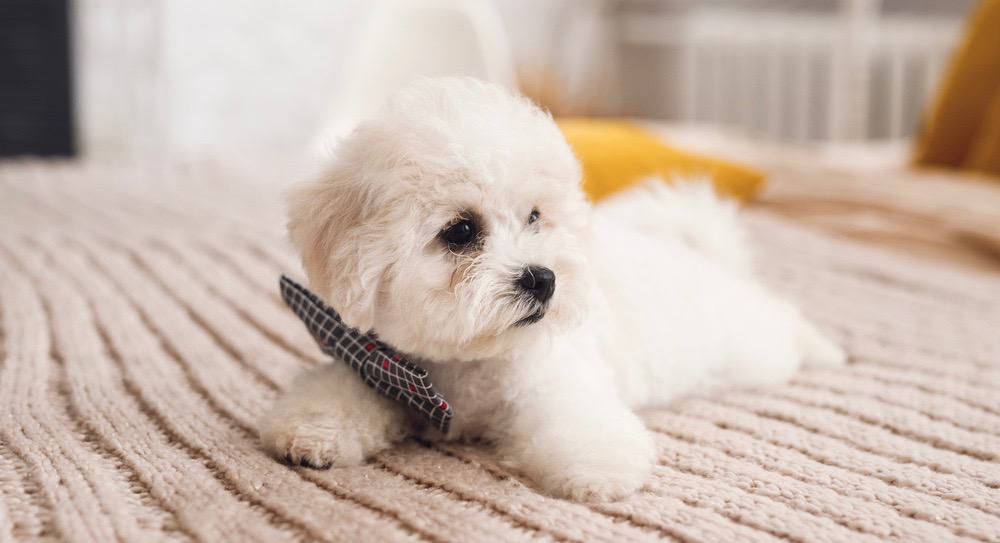
The following is what to expect from a Bichon Frise growth chart:
Birth – 2 Weeks
This is the neonatal period when the puppy is fully dependent on the mother. At this age, the puppy’s eyes and ears are not yet open and cannot see or hear. The only senses developed are those for touch and taste.
At this age, the puppy drinks the mother’s milk as a source of food. The puppy can be fed puppy formula if the mother is not producing enough milk to ensure that they get all the necessary nutrients for growth and development.
3 Weeks – 12 Weeks
During week three, the puppy continues to develop their sense of taste and hearing. Their eyes will open, and their first teeth will start coming through.
They will start crawling backward and forward and begins to wag the tail and stand. Their personality will also develop at this stage.
At 4 weeks, you can start weaning the puppy and at 8 weeks they should be fully weaned and ready to transition to their new homes.
This is the age to vaccinate and socialize them. At this stage, your Bichon will start acting like a dog and they will start barking, chasing, and biting.
Whatever your puppy learns at this stage will have a huge impact on their adult life, therefore, teaching them obedience is crucial at this stage.
4 Months – 9 Months
At this stage, your Bichon puppy will try to resolve and clarify their boundaries and express their dominance by wanting to be the leader of the pack.
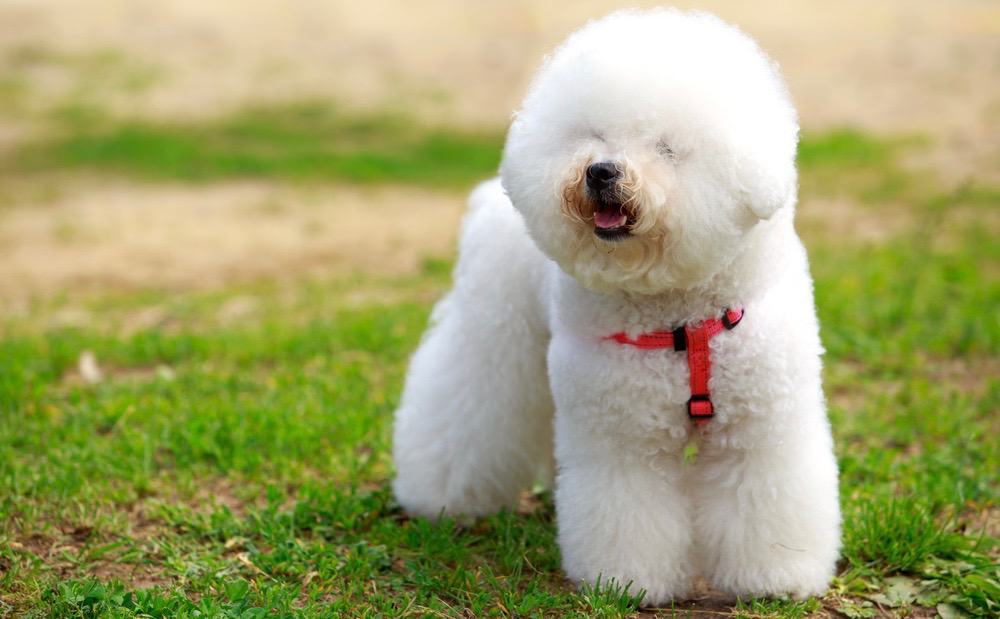
This is the right time to show them that you are in charge. Their baby teeth will fall off and be replaced by adult teeth.
This is the stage where your puppy goes through the adolescent phase. It is the right time to spay or neuter your puppy if you do not want to breed them.
10 Months – 18 Months
At 10 months, Bichon puppies stop growing and they reach their adult weight and height because they are a small breed of dogs. At this age, you should continue to socialize and train them to ensure that they grow to be healthy and happy.
Adult
As adults, Bichon puppies are sexually, physically, and mentally mature.
This is the maturity stage where your dog needs to be provided with a balanced and complete diet as well as adequate exercise to ensure that they are healthy and maintain the ideal weight for their age.
How Big Do Bichons Get?
The first way to know how big your Bichon puppy will get is to look at their parents. Consider the average size of the parents and it will give you an idea of the adult size of your puppy.
Sometimes, puppies take the size of their mother and sometimes they take the size of the father.
Another way is to look at their paws. The general rule of thumb is if the feet of your puppy look big for their body, then they are still growing and if their feet are the same size as their body, then they will not grow any bigger.
You can also do a DNA test to know the adult size of your puppy especially if you do not know the size of their parents.
As adults, Bichons stand at a height of between 9 and 11 inches and weigh between 10 and 18 pounds.
Will Neutering/Spaying My Bichon Affect His Growth?
Neutering is the surgical removal of testicles of male dogs while spaying is the surgical removal of ovaries and fallopian tubes of female dogs. Neutering and spaying prevent breeding and pregnancy respectively.
Since the hormones responsible for growth and development work with reproductive hormones, early neutering or spaying can affect the closure of growth plates making your dog grow taller than they should.
The right age to spay or neuter your Bichon is between the ages of four and nine months but speak with your vet for a recommendation.
Spaying and neutering help reduce the risk of certain cancers related to the reproductive organs and minimize aggressive behaviors in dogs.
Bichon Size Chart
Knowing your Bichon puppy’s height will enable you to purchase the right accessories and kennel doors for them. If your puppy participates in dog shows, you will also be required to give their height.
To find out the height of your Bichon Frise, let them stand straight on the ground.
Find out their withers (the highest point between their shoulders) and take a measuring tape and measure from the ground to the withers. This is your puppy’s height.
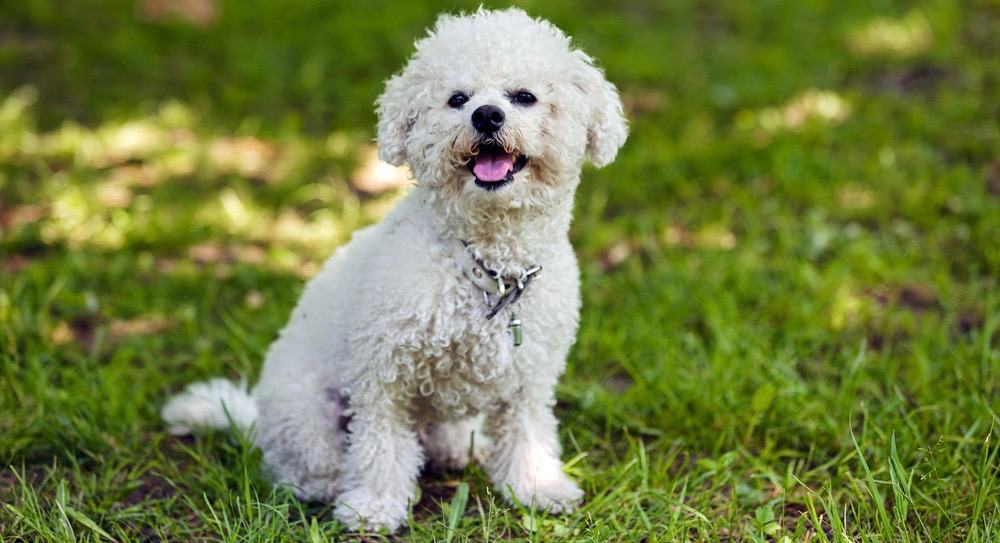
Generally, the height of both the male and female Bichon Frise is between 9 and 11 inches.
Bolognese Dog Vs Bichon Frise Size
These breeds are both small. They are similar and belong to the same family group. Bichon Frise is stronger and bigger both in muscles and bones. Bichon’s length is longer than the height. They stand between 9 and 11 inches and weigh 10 to 16 pounds.
Bolognese is like a real toy breed and more fragile. Bolognese has a smaller, compact, and stocky body which is square in height and length.
Bolognese males stand between 10.6 and 11.8 inches at their shoulder’s highest point, while females are between 9.8 to 11 inches. They weigh between 6 and 14 pounds.
Factors That Affect Bichon Growth
The following factors can affect the growth of a Bichon puppy:
Genetics And Gender
Genetics affect the growth and size of every dog, and you cannot do much to change it. It is also good to learn that if the grandparent or the parents of the puppies have a genetic disease, they will pass it on to them.
Therefore, understand the history of the puppy you want to adopt. The parent size also prepares your expectation on any changes in the shape of your dog.
Gender also affects the size of Bichons. Typically, females are smaller than males.
Nutrition
Providing a balanced diet to your Bichon is good. You should feed your puppy high-protein food to help with muscle growth.
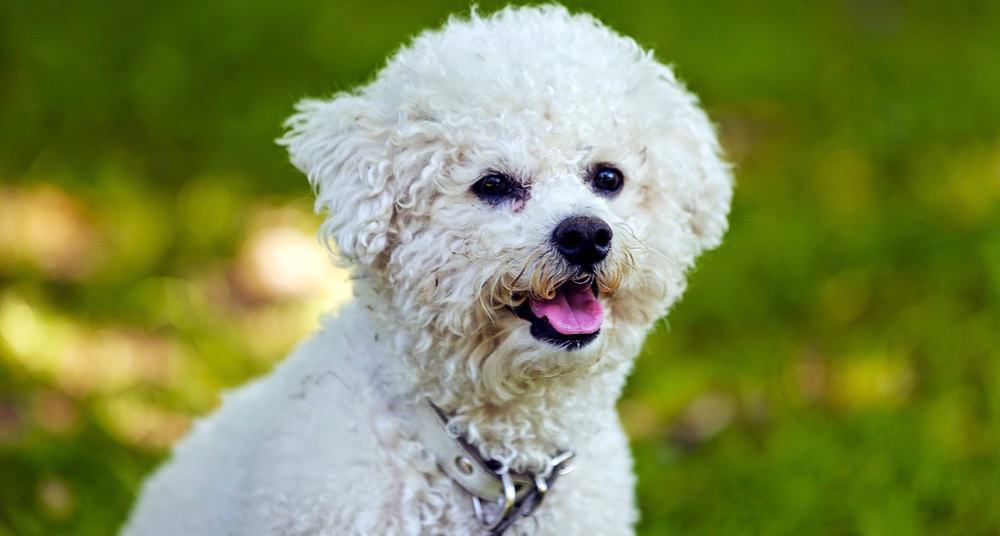
In addition, follow the instructions given on the food packaging and ensure to follow your vet’s instructions when it comes to the portion sizes.
Physical Activity And Health
Introducing exercise into your dog’s routine is important because it keeps them in the right weight and in good shape.
Exercise improves cardiovascular health and helps prevent diseases such as arthritis, high blood pressure among others. Exercise also improves your dog’s social life as well as their mood and sleep.
What If My Bichon Is Not The Right Weight?
The average weight of a Bichon is about 7 to 16 pounds, although it varies to individual dogs. If your dog weighs 10-20% above the ideal weight, they are overweight, and if they are over 20%, they are obese.
An overweight Bichon does not have a definition in the stomach area and has no waist.
The treatment focus of overweight puppies is by losing weight. If your Bichon is overweight, your vet will recommend the frequency of treatment, proper food, serving sizes, and exercise options for your dog.
Feed your Bichon low fat but high protein food and eliminate treats and table scraps from your dog’s diet. Exercise is also an important point to lose weight.
Exercise your Bichon daily for 30 minutes through swimming, daily walking, and training workout.
An underweight dog is also not healthy. This could be an indication that they are suffering from a certain disease.
Your dog could be losing weight because they are hyperactive or have a problem with their diet. Therefore, visit a vet when you suspect your dog is underweight.
Bichon Genetics And Common Health Problems
The following are some of the health conditions that Bichons are genetically predisposed to:
Bladder problems – This breed can contract bladder infections and bladder stones. Factors that can cause bladder stones include excessive phosphorus, magnesium, and proteins in the diet.
Bacterial and viral infections can cause bladder infections.
Allergies – Bichons are prone to allergies caused by food or contact. They are also known to be sensitive to fleabites.
Therefore, if your Bichon is licking his paws, scratching, or rubbing the face often, it might be an allergy, have them checked by the vet.
Patellar luxation – Patellar luxation means the dislocation of the knee joint which can cause pain in your dog.
Vaccination Sensitivity – Most Bichons suffer from vaccination sensitivity. Symptoms are lethargy, soreness, facial swelling, and hives. Some dogs may develop complications and even die.
Hip dysplasia – is a genetic condition where the thighbone doesn’t fit well into the hip joint. Some dogs display lameness and pain, while others do not show outward signs of discomfort.
Juvenile cataracts – This condition sometimes develops in young Bichons. Therefore, if you want to adopt a puppy, ensure the breeder’s stock is certified by the Canine Eye Registration Foundation.
Final Words
Hopefully, you can now find out how big your Bichon puppy will get by looking at their paws, parents, or doing a DNA test. Also, note that genetics, nutrition, and physical activity can affect the growth of your puppy.
The best way to predict the growth of your puppy is to measure and record their weight each week.
Weighing your Bichon puppy regularly will ensure that you are monitoring their weight so that you can detect any abnormalities earlier.
If you are not sure what weight your Bichon puppy should be at a certain age, speak to your vet for more information.

